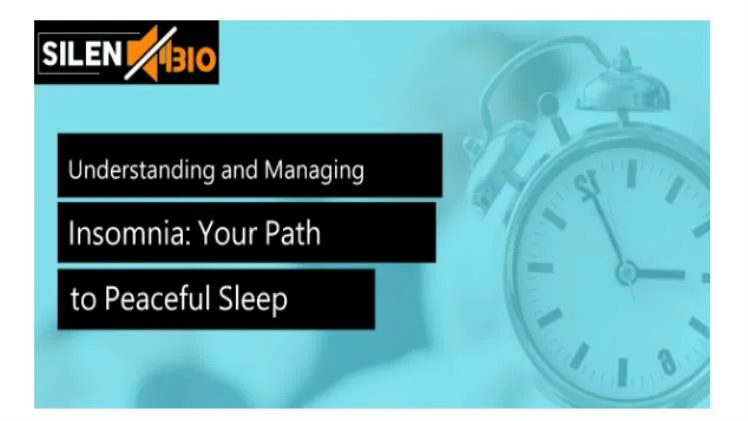Do you find yourself tossing and turning in bed? Or unable to fall asleep or stay asleep through the night? If so, you’re not alone. Insomnia is a common sleep disorder affecting millions of people worldwide. This comprehensive blog will delve deep into insomnia. It will help you understand its various aspects and provide practical strategies to manage it effectively.
Understanding Insomnia
Insomnia is characterised by difficulty falling asleep, staying asleep and experiencing non-restorative sleep despite having the opportunity to sleep. It can be classified into two main types: acute insomnia and chronic insomnia. Acute insomnia lasts for a short duration and is often tied to a specific event or stressor. Chronic insomnia persists for at least three nights a week for three months or longer. A combination of factors including psychological, medical and lifestyle-related issues can cause chronic insomnia.
Common Causes of Insomnia
1. Stress and Anxiety
The most common cause of insomnia is stress and anxiety. Racing thoughts and worry can make it difficult to relax and fall asleep. This leads to a vicious cycle of sleeplessness.
2. Poor Sleep Hygiene
This includes irregular sleep schedules, excessive screen time before bed, and sleeping in an uncomfortable environment. Such habits disrupt the body’s natural circadian rhythm.
3. Medical Conditions
Chronic pain, heartburn, asthma and other medical conditions can interfere with sleep. Also, conditions like depression and anxiety are closely linked to insomnia.
4. Medications
Certain medications can disrupt sleep patterns as a side effect. These include stimulants, decongestants and some antidepressants.
5. Lifestyle Factors
Caffeine, nicotine and alcohol can all interfere with sleep. Consuming these substances close to bedtime can make falling and staying asleep challenging.
Managing Insomnia
- Lifestyle Changes
- Non-medications
- Medications
Lifestyle Changes for Managing Insomnia
1. Establish a Consistent Sleep Schedule
Go to bed and wake up simultaneously every day, even on weekends. This helps regulate your body’s internal clock.
2. Create a Relaxing Bedtime Routine
Engage in calming activities before bedtime, such as reading, taking a warm bath, or practising relaxation techniques like deep breathing.
3. Limit Screen Time
Screens emitting blue light can disrupt the production of melatonin. It is a hormone that regulates sleep. Avoid screens at least an hour before bedtime.
4. Watch Your Diet
Limit caffeine and alcohol intake, especially in the hours leading up to bedtime. Avoid heavy or spicy meals close to sleep to prevent indigestion.
5. Exercise Regularly
Regular physical activity can improve sleep, but avoid strenuous exercise too close to bedtime, as it may have the opposite effect.
6. Optimize Your Sleep Environment
Ensure your bedroom is dark, quiet, and comfortable. Invest in a good mattress and pillows to support restful sleep.
Treatment Approaches for Insomnia
There can be two approaches for treating insomnia if lifestyle changes don’t work:
- Non-medication approaches
- Medication approaches
Non-Medication Approaches to Insomnia Treatment
1. Cognitive-Behavioral Therapy for Insomnia (CBT-I)
It is a highly effective therapy. This addresses the underlying causes of insomnia and promotes healthy sleep habits.
A trained therapist can help you identify and change negative thought patterns and sleep-related behaviours.
CBT-I often includes techniques for relaxation, sleep restriction, and stimulus control to improve sleep quality.
2. Relaxation and Meditation Techniques
These techniques can be effective in calming the mind and promoting better sleep:
- Try progressive muscle relaxation, where you systematically tense and then release different muscle groups.
- Practice mindfulness meditation to cultivate awareness and reduce stress.
- Massage and Guided imagery exercises can help create a peaceful mental environment conducive to sleep.
3. Sleep Aids: Over-the-Counter vs. Prescription
Some individuals may consider using sleep aids. It’s essential to use them cautiously and under the guidance of a healthcare professional.
- Over-the-counter (OTC) Sleep Aids
Standard OTC options include antihistamines like diphenhydramine, melatonin supplements, etc.
These may be suitable for occasional use. But they should not become a long-term solution.
- Prescription Sleep Medications
Prescription sleep medications are typically used when other treatments have been ineffective.
They should be used under the close supervision of a healthcare provider to minimise the risk of dependence or side effects.
Medications for Insomnia Treatment
Medications can be a short-term solution for severe insomnia when non-medication approaches have failed. Following are Different Types of Medications for Treating Insomnia.
1. Sedative-Hypnotics
Sedative hypnotics are the most common class of prescription sleep medications. The dosage works by depressing the central nervous system to induce and maintain sleep.
Examples: Zolpidem Tartrate, Eszopiclone (Lunesta), Zaleplon (Sonata)
2. Antidepressants
Some antidepressant medications are prescribed off-label to treat insomnia.
- Examples: Trazodone, Doxepin (Silenor)
3. Melatonin Receptor Agonists
Melatonin receptor agonists, such as Ramelteon (Rozerem), target melatonin receptors to regulate the sleep-wake cycle.
- Examples: Ramelteon (Rozerem)
4. Orexin Receptor Antagonist
Suvorexant (Belsomra) is a medication that blocks the action of orexin, a neurotransmitter involved in wakefulness.
- Examples: Suvorexant (Belsomra)
Final Verdict
Understanding and managing insomnia is crucial for achieving restful and rejuvenating sleep. This comprehensive guide has explored the various facets of insomnia, including its causes and treatment options. From lifestyle changes and non-medication approaches to a detailed look at different insomnia medications, you now know how to embark on your path to peaceful sleep. Remember, the key to overcoming insomnia is a personalised approach, considering your unique circumstances and preferences.



